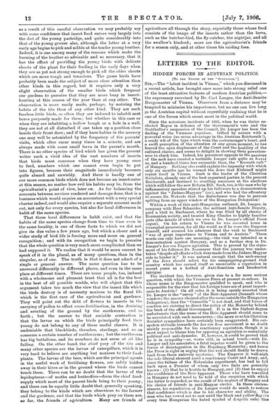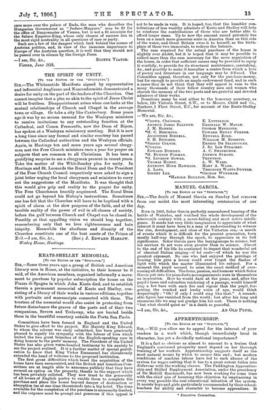LETTERS TO THE EDITOR.
HIDDEN FORCES IN AUSTRIAN POLITICS.
[To THE EDITOR Or THE '‘ SPECTATOR.']
Sza,—The " latest incident in Vienna," which you discussed in a recent article, has brought once more into strong relief one of the least attractive features of modern Austrian politics,— the supremacy exercised by Dr. Carl Lueger, the Anti-Semite Burgomaster of Vienna. Observers from a distance may be tempted to minimise his importance, but no one can live long in the Austrian capital without regretfully realising that he is one of the forces which count most in the political world.
Since the notorious incidents of 1895, when he was thrice re- elected Mayor in defiance of the Government's veto and the Statthalter's suspension of the Council, Dr. Lueger has been the darling of the Viennese populace. Gifted by nature with a powerful voice (no mean advantage in the Atistrian Reichsrath !), a ready wit of the type which wins the costermonger's heart, and a swift perception of the situation at any given moment, he has braved the open displeasure of the Court and the hostility of the cultured classes, and seems to delight in showing their powerless- ness to check him. Indeed, his persistent appeals to the passions of the mob have created a veritable Lueger cult quite as furvia as, and a hundred times less excusable than, the "Kossuth cult" of Hungary. Nothing else could explain the impunity with which only six months ago he warned the Jews that Kishineff might repeat itself in Vienna. Such is the leader of the Christian Socialists, already one of the best organised parties in the present Reichsrath, and destined to startling successes at the elections which will follow the new Reform Bill. Such, too, is the man who by inflammatory speeches stirred up his followers to a demonstration against the "Judaeo-Magyars' (sic), and who had the effrontery to assure Dr. Wekerlo that the disturbance was due to persons spitting from an upper window of the Hungarian Delegation !
Within a week of this anti-Hungarian outburst, Dr. Lueger, in company with Herr Schneider, the militant Anti-Semite Deputy, paid a visit to Bucharest, where he was feted by all classes of Roumanian society, and treated King Charles to highly familiar jests (the details of which we owe to Dr. Lueger's official Press organ). On his return to Vienna he was escorted home in triumphal procession, for all the world as if he were the Emperor himself, and assured his admirers that the visit to Bucharest "was of great importance to Vienna and to Austria." These words can only have one meaning,—the visit was intended as a demonstration against Hungary, and as a further step in Dr. Lueger's Los von Ungarn agitation. This is proved by the state- ment of his follower Dr. Neumayer that the journey was under- taken "despite all efforts which were made from the Judaeo-Magyar side to hinder it." It was natural enough that the arch-enemy of the Jews should select for his campaigning-ground that country which has earned itself so unenviable a reputation in recent years as a hotbed of Anti-Semitism and Irredentist intrigue. The incident has, however, given rise to a far more serious question, with which the Viennese Press at present re-echoes. In whose name is the Burgomaster qualified to speak, and who is responsible for the view that his foreign tours are of great import- ance to Austria ? On all sides it is being openly asserted that Dr. Lueger is the "envoy" of the Heir-Apparent (beneath whose windows the masses cheered after the scene outside the Hungarian Delegation), that the " Carnarilla " is not dead, and that forces of reaction are striving to direct the policy of the Monarchy behind the back of the official Government. It is in the highest degree unfortunate that the name of the Heir-Apparent should come to be associated with such manceuvres,—the more sons his Christian Socialist sympathies have certainly been exaggerated. His out- spoken attitude towards the Los von Rom movement is no doubt mainly responsible for his reactionary reputation, though it is most unjust to blame him for opposing an agitation so essentially political and anti-dynastic. If, however, it could be proved that he is in sympathy—or, worse still, in actual touch—with Dr. Lueger and his associates, a fatal impetus would be given to the forces of disintegration in the Hapsburg Monarchy ; and hence the Press is right in urging that the veil should finally be drawn back from these unlovely mysteries. The Emperor is well-nigh the sole liberal element amid a reactionary Court and Army, and, since the failure of the Hohenlohe experiment, has bad to fall back upon a Premier of whom only two facts are generally known : (1) that he is hostile to Hungary, and (2) that he enjoys the confidence of the Heir-Apparent. Those who have travelled in Hungary do not need to be told of the suspicion with which the latter is regarded, as the result of his neglect of Hungary and his choice of friends in anti-Magyar circles. In these circum- stances, his repudiation of Dr. Lueger would do much to restore that confidence which is due to his character and ability. The man who has vowed not to rest until the black and yellow flag ( I o every true Hungarian the bated symbol of despotic rule) flies
once more over the palace of Buda, the man who describes the Hungarian Government as " Judaeo-Magyars," may ho fit for the office of Burgomaster of Vienna, but is not a fit associate for the future Emperor-King, whose only chance of success lies in the most rigid neutrality in all questions of race or party. Such are a few of the dangers which lurk behind the scenes of Austrian politics, and, in view of the immense importance to Europe of the Austrian question, it is well that they should not be passed over in silence by the foreign Press.
Vienna, June 26th.



















































 Previous page
Previous page